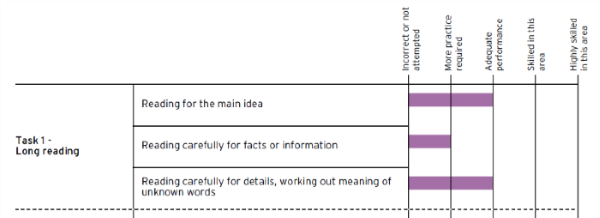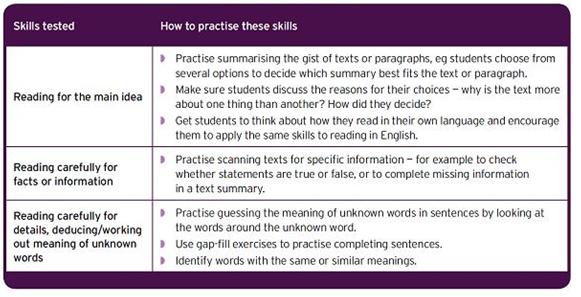Within 21 days of taking your exam, you will be emailed your final result and your Diagnostic Report. Upon receiving a passing grade, after receiving your final result email, you will receive a 2nd email within 24hrs from, 'Trinity College London via Accredible', with a link to access your digital certificate. Make sure you check your junk/spam folder for these emails. When you receive your ISE results, you will also receive:
- a diagnostic report for each skill showing how you performed in the test
- a certificate - when you pass both parts of the test (Speaking & Listening, Reading & Writing)
If you require a printed certificate, please call us on 0333 358 3183 Monday to Friday 8.00am – 8.00pm or Saturday and Sunday 8.00am – 5.30pm. A charge of £12.50 will apply.
See below for information about:
- If you pass or fail
- Understanding your diagnostic report
- ISE scoring information
- How to improve your skills if you have failed
Information for candidates who have taken a SELT ISE for visa purposes:
Candidates who pass
If you passed both parts of the exam, you will receive:
- an ISE certificate showing Pass, Merit or Distinction for each skill: reading, writing, speaking and listening
- a diagnostic profile report for each skill showing how you performed - this shows you where to develop your skills in the future
Candidates who fail
If you fail either or both parts of the exam, you will receive:
- a letter confirming that you did not achieve a pass grade in all 4 parts of the exam and therefore you do not receive a certificate
- a diagnostic profile report for each skill showing how you performed - this identifies areas for improvement
To improve your skills use the information in the report to identify relevant practice activities in our skills development tables below. When you are ready, you can book to re-take your test.
Diagnostic profiles
A diagnostic profile report for each part of the exam show the skills tested for reading, writing, speaking and listening.
To see an example of a full ISE I diagnostic report, see below:
Here is an example of a candidate’s diagnostic report for Task I - Long Reading in the Reading & Writing part of the exam. It shows the three language skills measured by Task 1:
Diagram A: Diagnostic Profile Report (extract)
Long Reading - Task 1
Although this candidate's sub-skills in 'reading for the main idea' and 'reading carefully for details' are good (ie the coloured bars correspond to 'adequate performance'), the sub-skill of 'reading carefully for facts or information' needs further development (ie the coloured bar corresponds to 'more practice required').
In this example, the candidate should refer to the Skills Development Table shown below for suggestions on how to improve this particular sub-skill of reading.
How can I use these to develop my skills?
Your diagnostic report is very useful for identifying which skills you must develop and practise to improve. Use the information in the report to identify relevant practice activities in our skills development tables below.
Skills Development tables
These tables list the skills tested in each part of the exam and offer practical ideas about where to target and practise skills for improvement. Designed for teachers to use in the classroom they are also useful to people preparing for ISE exams.
Diagram B: Example Skills Development Table (extract)
Task 1 - Long Reading
ISE I Skills Development Tables
Refer to the tables below to see what you can do to practise your skills:
ISE I (B1)
Additional support
Visit Prepare for your ISE I SELT test for more guidance and support to help you prepare for your test.
Trinity is committed to ensuring that the standard of each qualification remains consistent over time and so reserves the right to make appropriate adjustments to published grade thresholds and/or methods of aggregating marks.

